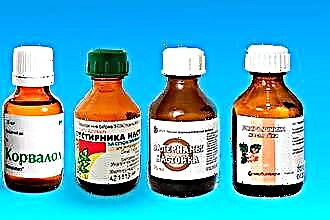If laryngitis in a child has arisen due to the activity of viruses, it can proceed almost unnoticed. Since the viral form of the disease is considered the easiest, folk medicines are enough to treat it. However, under unfavorable conditions, viral laryngitis can be complicated by a bacterial infection and subsequently develop into tracheitis or bronchitis.
Antibiotics for laryngitis in children can be used with confirmed bacterial infection. To understand the origin of the disease, of course, you need to consult a pediatrician. However, parents also need to know which signs indicate bacterial laryngitis and which antibiotics will be most effective for children.
When antibiotics are needed
Is it advisable to treat laryngitis with antibiotics in children? The answer to this question is hidden in the origin of this disease. What already  mentioned, there are 2 types of laryngitis - viral and bacterial. The first to manifest itself is an ordinary cold. Common symptoms include fever, stuffy nose, and dry cough. In this case, treatment should be anti-cold in order to eliminate unpleasant symptoms. It is necessary for the child to just observe bed rest and drink more warm drinks. It is also recommended to drink a course of vitamins.
mentioned, there are 2 types of laryngitis - viral and bacterial. The first to manifest itself is an ordinary cold. Common symptoms include fever, stuffy nose, and dry cough. In this case, treatment should be anti-cold in order to eliminate unpleasant symptoms. It is necessary for the child to just observe bed rest and drink more warm drinks. It is also recommended to drink a course of vitamins.
Such events will help to cope with viral laryngitis. Antibiotics are not needed here, and even more, they are completely useless. If the inflammation of the larynx has occurred due to the development of a bacterial infection, then the use of antibacterial drugs is not only justified, but also necessary.
Bacterial laryngitis is usually caused by streptococci or staphylococci. This type of disease can be recognized by the characteristic increase in temperature, which can rise to 38 ° C and even exceed 39 ° C. If the child's temperature has exceeded 39 ° C, you should immediately call an ambulance or urgently take him to the doctor yourself.
Chills are considered another marker of the bacterial origin of the disease. Sometimes the child can cough up phlegm mixed with pus. If the chills and phlegm are accompanied by a fever, antibiotic treatment will be most effective.
But even if you are firmly convinced that you are faced with bacterial laryngitis, do not rush to the pharmacy for an antibiotic. Check with your doctor first. After all, the health of your baby can be the price of a mistake.
The doctor usually prescribes antibacterial drugs for children with:
- bacterial laryngitis confirmed by test results;
- chronic otitis media;
- regularly occurring acute respiratory infections;
- maintaining an elevated temperature for more than 3 days;
- purulent complications;
- the appearance of sinusitis;
- complications in the form of bronchitis or pneumonia.
If the laryngitis is not accompanied by a fever, antibiotics are usually not prescribed. It should be treated in the same way as a common cold. With a correct and timely diagnosis, as well as correctly prescribed treatment, the child fully recovers within 7-10 days.
List of drugs for children
The doctor should prescribe antibiotics to children very carefully. It is necessary to exclude the possibility of side effects that are abundant in these drugs. After all, the main task is to cure laryngitis, and not add additional problems to it.
 The pediatrician can prescribe antibacterial medicine to the child only after he donates blood for a general analysis. Its results will make it possible to find out the origin of the disease. In addition to this analysis, the doctor takes a smear from the laryngeal mucosa and sends it for a bacterial examination. The smear result is ready in about 3-4 days. Note that smear sampling is not performed at every treatment with suspected laryngitis.
The pediatrician can prescribe antibacterial medicine to the child only after he donates blood for a general analysis. Its results will make it possible to find out the origin of the disease. In addition to this analysis, the doctor takes a smear from the laryngeal mucosa and sends it for a bacterial examination. The smear result is ready in about 3-4 days. Note that smear sampling is not performed at every treatment with suspected laryngitis.
Sometimes clinical symptoms (especially if they are pronounced) are enough to make a diagnosis. In most cases, a bacterial test is prescribed when the disease has already acquired a chronic form. The main purpose of this analysis is to determine the resistance of bacteria to antibacterial drugs.
- If the child is already 3 years old, and laryngitis is easy enough, you can limit yourself to a local antibiotic. In this case, we are talking about the drug "Bioparox", which is characterized by antibacterial and anti-inflammatory effects. It aims to kill streptococci, staphylococci, pneumococci and mycoplasma. The medicine is available in the form of an aerosol. It must be sprayed directly into the oral cavity so that the active substance acts on the larynx area. To increase the effectiveness of the use of a local antibiotic, it is necessary to do inhalation and rinsing. You can also supplement the course of treatment with expectorant drugs. Of course, this requires an increase in the amount of fluid consumed.
- If laryngitis is severe or complications have arisen, the doctor prescribes systemic antibiotics from the category of penicillins (for example, "Ekoklav", "Amoxiclav") or macrolides ("Azithromycin", "Erythromycin", "Clarithromycin"). The dosage can only be adjusted by a doctor. In no case should you be self-appointed.
- With stenosing laryngitis (one of the dangerous forms of the disease), children are usually prescribed medications related to cephalosporins (Cefotaxime, Ceftriaxone, Cefepim).
 If the disease is very difficult, the child is referred to a hospital for treatment. The hospital uses antibiotics-carbapenems (injections).
If the disease is very difficult, the child is referred to a hospital for treatment. The hospital uses antibiotics-carbapenems (injections).
You can also treat bacterial laryngitis in children with a solution of antibacterial drugs. The otolaryngologist pours it into the child's larynx using a special syringe. This procedure must be combined with the instillation (pouring) of hydrocortisone.
If laryngitis often recurs, then the doctor prescribes an antibiotic only after the result of bacteriological examination of a smear taken from the larynx is ready. Chlamydia is often found in it. In this case, antibiotic therapy is supplemented with recombinant interferon (form of release - suppositories). An alternative option is a monthly course of antihistamines.
Even if you know exactly what antibiotic your child needs (when the last time was ill, the doctor prescribed it), still consult with a pediatrician or otolaryngologist. After all, uncontrolled intake of such drugs can provoke the appearance of side effects.
The doctor will take into account all the factors (symptoms, degree of intoxication, test results, number of relapses) and select the optimal and most effective drug for your baby.
Admission rules
To avoid the appearance of any side effects, while taking any antibacterial drug, you must adhere to certain rules. Let's list them:
- The choice of medicine must be entrusted to the doctor.
- The child should be shown to the doctor after 3 days of antibiotic use. The doctor will assess the baby's condition and recommend completing the course or continuing the treatment.
- If the child has an allergic reaction (itching, rash, hives, or something else), it is necessary to immediately inform the attending physician. The drug will need to be replaced.
- If, after the start of taking the prescribed medication, the baby's condition worsened, it is no longer possible to give such a medication. Cancel it and see a doctor.
 The dosage and time of admission must be strictly observed.Arbitrariness is strictly prohibited. The use of an antibiotic for more than 2 weeks is fraught with an increase in the resistance of the pathogenic bacteria to its active substance. This means that later you will need to take a stronger medicine.
The dosage and time of admission must be strictly observed.Arbitrariness is strictly prohibited. The use of an antibiotic for more than 2 weeks is fraught with an increase in the resistance of the pathogenic bacteria to its active substance. This means that later you will need to take a stronger medicine.- It is recommended to follow a gentle diet while taking antibacterial drugs.
- After the completion of the course of treatment, it is desirable that the child take one of the vitamin complexes for a month (a choice of "Pikovit", "Vitrum Kidz", "Vitrum", "Supradin"). In addition, to put in order the intestinal microflora will need to take pre- and probiotics ("Hilak Forte", "Linex").
- If, after completing the course of antibiotics, the baby's digestion is disturbed, the situation will be corrected by a 2-week intake of "Mezim" or "Pancreatin".
The implementation of these simple rules will not allow laryngitis to worsen, and if it proceeds in an acute form, it will turn into a chronic one.
However, it is very important to realize that the antibiotic is not capable of destroying all existing types of bacteria. Therefore, the treatment should be adjusted if there is no improvement 2 days after the start of its administration.
Contraindications to the use of many antibiotics are:
- a history of information about individual intolerance to the components of the drug or allergies (for example, to penicillins);
- early childhood - up to 3 years.
And finally
 Only an experienced specialist can prescribe antibacterial medicines. These are serious drugs that should not be fed to a child at the first "sneeze". Uncontrolled intake of such drugs threatens the development of unpleasant and dangerous side effects, as well as the resistance of harmful bacteria to them.
Only an experienced specialist can prescribe antibacterial medicines. These are serious drugs that should not be fed to a child at the first "sneeze". Uncontrolled intake of such drugs threatens the development of unpleasant and dangerous side effects, as well as the resistance of harmful bacteria to them.
Can laryngitis be cured without antibiotics? Only a doctor can answer this question, guided by the results of tests and examination of your baby. And if he claims that antibacterial drugs are indispensable, they will have to be taken. After all, improperly treated laryngitis can cause serious complications.

 If the disease is very difficult, the child is referred to a hospital for treatment. The hospital uses antibiotics-carbapenems (injections).
If the disease is very difficult, the child is referred to a hospital for treatment. The hospital uses antibiotics-carbapenems (injections). The dosage and time of admission must be strictly observed.Arbitrariness is strictly prohibited. The use of an antibiotic for more than 2 weeks is fraught with an increase in the resistance of the pathogenic bacteria to its active substance. This means that later you will need to take a stronger medicine.
The dosage and time of admission must be strictly observed.Arbitrariness is strictly prohibited. The use of an antibiotic for more than 2 weeks is fraught with an increase in the resistance of the pathogenic bacteria to its active substance. This means that later you will need to take a stronger medicine.

